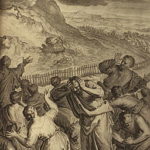Cussing Grandma
 Back in 1997 when I worked for a Christian bookstore, the owner expressed his disbelief at how a Christian could write a book filled with cussing. The book in question was Frank Schaeffer’s fictional book, Saving Grandma, the second in a trilogy. It also had a lot of sexual material as well. Confirmed by a review from Amazon:
Back in 1997 when I worked for a Christian bookstore, the owner expressed his disbelief at how a Christian could write a book filled with cussing. The book in question was Frank Schaeffer’s fictional book, Saving Grandma, the second in a trilogy. It also had a lot of sexual material as well. Confirmed by a review from Amazon:
Most of the humor this time comes from aspects that will make evangelicals raise their eyebrows: Grandma’s profuse swearing, the lampoons of fundamentalist seperatism, and sex, lots of it, sometimes quite explicit (par for the course for a mainstream literary novel–but really hot for an evangelical novel).
I checked the other 31 reviews on Amazon. While the sexual content bothered a few, and several mention the grandmother’s foul mouth, only 1 out of 32 reviews mentions it specifically in a negative way. I was a little surprised. As often as I hear Christians are anti-cussing, I would have expected more than one negative mark on the language issue.
But for my boss, he couldn’t get past how a Christian could write something like that. I’ve heard that sentiment expressed by others as well.
There is a tendency among Christians to associate the morals of the author with his characters, especially if those characters are the good guys.
But only on two sins: sex and cussing.
The protagonist can commit murder, and the reader would not jump to the conclusion that the author approves of murder. The hero can gossip, steal, covet, and readers don’t assume the author does those activities.
Why primarily those two? Why if a novel contains cussing do some then accuse the author of doing the same and doubt his Christianity?
Here’s my list of why I think people tend to take that view.
Vicarious Participation
People tend to read or write about a lot of those sins and walk away not feeling that they have participated in them. Reading about someone stealing doesn’t arouse desires in most of us to steal something. Not so with sex and cussing.
If reading cuss words makes a reader feel like they are cussing, then how much more the one who wrote those words.
For out of the abundance of the heart the mouth speaketh. (Mat 12:34b)
The characters are fictional. They only exist in the heart and mind of the author. If cuss words hit the page, it must come from the author’s heart.
Other sins are driving the plot in good books. Cussing either is or feels gratuitous.
Yes, there can be times when cussing could be plot related, if not directly, via characterization. But generally, most cussing could be removed and the plot wouldn’t change significantly, if at all.
If it feels gratuitous to the reader, they will perceive it as an author intrusion. They will assume it is there because the author wanted to revel in it rather than being necessary for the story or the character.
Can you think of more?
Sometimes, however, nothing else will work.
As most of you know, I don’t tend to swear much. When I do, it is more as satire than as a serious expletive. I’ve never been much of a cusser.
But in one novel I wrote, I came to a point where a character was frustrated, and I wanted to indicate that. On my first draft, I quoted him as saying, “Damn.” I moved on, figuring I’d evaluate and change it in a subsequent edit.
When I came back to it, I went through a list of alternate words, but none of them seemed to fit. Maybe I could show it without dialog, but the actions didn’t seem to suffice by themselves. It didn’t fit the character.
I considered the, “he cussed” telling option, but my dialog heavy writing style doesn’t lend to that method save for transitions between scenes. It would be jarring to jump to telling about the dialog when I didn’t do that elsewhere.
In the end, I left it as is. My book had a cuss word, mild though it might be for your average general-market reader. It wasn’t because I cuss much, or even that the character did much. But it was the only way it felt believable to the character and situation.
But will the reader perceive it that way? Will they think I run around all the time saying, “damn” because my character said it once? I’ll let you know if it ever gets a negative review on that account or not.
Where do you draw the line in your reading?







































Mild words like the one you included wouldn’t make me bat an eye. But I dislike extreme words, even in secular fiction. If it fits the situation, and is used sparingly, I’ll cringe but allow it. But used too frequently or inappropriately and it will ruin the book for me. And it’s only in those situations were I might wonder about the author’s vocabulary. 😉
Arguing that cuss words don’t change the plot seems a little silly to me. Language and vocabulary are an integral part of storytelling. Case in point would be yesterday’s article on story weariness. The same plot can be enjoyed multiple times because of changes in how it is expressed.
Substitute some other word choice in for “cussing” like so:
But generally, most metaphors could be removed and the plot wouldn’t change significantly, if at all.
But generally, most French words could be removed and the plot wouldn’t change significantly, if at all.
I happen to love “ly” adverbs even though some people would say they’re gratuitous in nearly 😉 all cases. I also love pretentious and antiquated words and old hat cliches and made up other world jargon.
This isn’t an argument against avoiding cussing in writing (or everyday speech). It’s just an argument against the idea that cuss words are gratuitous.
Leanna,
All so true, but from that point of view if the cuss words could be extracted and the story still work plot-wise, then it is gratuitous. It it is gratuitous, then they are their because it is coming from the author, thus reflecting the heart of the author rather than needed for the story.
Not that I agree with that point of view, but it is one way a person might perceive that it is coming from the author and indicative of their morals, rather than necessary to tell the story.
Did you mean from “a certain point of view” rather than “that point of view”?
I meant from the point of view of a person who might use that argument as to why they attribute a character’s cussing in the novel as a moral flaw in the author, and potentially judge the eternal destiny of the author based upon it. “Oh, he has his characters cuss. The author can’t really be a Christian, can he?”
That view, which is a certain point of view as well.
OK, I’ll throw in something to gum up the wheels of this well-oiled article. Frank Schaeffer is now calling himself an atheist. Granted, an atheist who believes in God, but if you read some of his articles (I haven’t read he latest book titled Why I Am An Atheist Who Believes In God), it’s pretty clear that he is far from believing in the Bible. Here’s a sample:
Never mind that Jesus said He came to fulfill the Law and that the Law and prophets testified of Him.
In the same article Schaeffer goes on to call the writers of the New Testament “bigots, opportunists and delusional fanatics.” Later he says, “As an ultimate f**k [word altered for posting here] you to rule-keeping scripture zealots everywhere, Jesus hung out with whores.”
Beyond exposing Schaeffer’s blasphemy, my point here is that his novel is not a good measure of what Christian bookstores (or possibly Christian houses—I don’t know who published the novel), are open to publishing. Undoubtedly Schaeffer rode his reputation as his father’s son, earning a contract for his novel.
Whereas the cursing and graphic sex don’t call into question Schaeffer’s faith in Jesus Christ, his other writing doesn’t leave much doubt that he doesn’t believe in the Jesus of the Bible. So is his novel an example of “Christian fiction”? I don’t see how it could be.
Becky
I concede this reminder also came to mind — Frank Schaeffer has long been veering toward a life based on an Anti (not that Christianity) rather than a glorious “pro” who is the very Person of Jesus Christ.
I don’t want to become Frank Schaeffer, if what people are saying about him is true. But I’ll never be able to understand “saved,” and I never stop struggling over that. And the concept of “Biblical Christianity” makes me grimace, because I can’t believe that one’s interpretation of the Bible determines one’s eternal destination or the legitimacy of one’s faith in Christ.
I never even cared about swearing or being edgy in order to rebel — still don’t. Just, the daily emptiness in the absence God seems worth swearing about. I’m soteriologically wrecked, and I’ve used up my quota of sinners’ prayers.
Bainespal, the very fact that you care about the question is an indication that you are the Father’s adopted son. As for the how of salvation — at some point we must admit that His word only tells some about that. The perfect answers to salvation’s mechanism — sotereology — is not a recitation of words but a Person. And somehow I take it He likes to keep His secrets about exactly how it works or even some abot why (if we could even understand it if He did tell us).
Wow, that’s dismissive for no good reason. It’s hard to piece together what you believe in once you’ve had to peel off the scabs of years of doubt, disillusionment, and the extra helping of angst piled on by a culture that attacks your value as a person as soon as you no longer toe the line (ie, the Othering song and dance deftly performed by Miller).
Becky,
When that novel came out, he was a member of the Orthodox Church and a professed Christian. The book was originally published in 1997 by Berkley Books, an imprint of Penguin. So not a Christian publisher.
He left the Orthodox Church some years ago, don’t remember exactly when but I’m wanting to place it around 2004-2007. The atheist who believes in God book was self-published last year, and as the title hints, means he’s not an atheist in the true sense of the word.
It is well-known he has rejected the Calvinistic/Evangelistic/Fundamentalistic faith of his parents. The referenced fictional trilogy paints a very caricatured picture of an Evangelical missionary family, some believe that while it is fictional, has many autobiographical elements to it. During that time, some in Orthodoxy were concerned about him because it was obvious he had a chip on his shoulder, and was running from rather than drawn to a faith. Sure enough, he kept running right out the exit door of Orthodoxy.
Where his heart was then and where it is now in relation to God, I can’t say. But the book I referenced was written by a professing Christian at the time. I offer it up not as an example of cussing used in a Christian book, but a Christian who wrote a book with a lot of cussing, and at least since it was republished in 2004, has little negative reviews on Amazon concerning the language. Indeed, the book has 4 stars and some very positive reviews, one reviewer comparing him to Mark Twain.
It is more a launch pad for the discussion at hand of how we tend to attribute morality to an author based on what his character’s morality is when it comes to cussing specifically, and also sex, and often judge their eternal destination upon it.
Huh, I wonder if I’ve read that somewhere. But you have to admit that he has a point in that modern-day Evangelical Christianity is, pretty much by necessity, different than the original stuff 2000 years ago. Christianity didn’t spring fully-formed from Jesus’s forehead, with the Apostle’s Creed in one hand and The Fundamentals in the other.
When it comes to swearing, the only time it bothers me is in any Tarantino flick (couldn’t get past the first 5 minutes of Reservoir Dogs for the excessive swearing alone), yet I can rewatch Harry Brown with no problem (it has over 100 f-words and a little over 10 uses of c*** throughout), maybe it’s because it’s organic to the story of gang warfare whereas I feel there’s really no good story merit to Tarantino’s movies and still goes overboard.
I found something in the online content of Relevant that pertains to this discussion, though it comes at it from a different direction. The main point of the article was new to me – that some language in the translations and versions we have has been sanitized. Don’t know how much of that I buy into without doing more research, but it is interesting.
Spoiler: Graphic sexual language is in this article, so if that offends you, best not to follow this link:
http://www.relevantmagazine.com/life/what-bleep-does-bible-say-about-profanity
Matthias,
Interesting article. I do know some things are toned down in translations, so I wouldn’t be surprised. I don’t know about the Song of Solomon reference the article talks about, but do recall Paul uses more graphic language in the Greek in Galatians in reference to the Judiazers going all the way with circumcision than tends to be translated as.
Some points to note, however. Language can be offensive without being used as an expletive. Also, language can be graphic without being offensive.
What is offensive as opposed to merely graphic would be culturally dependent. Too often even scholars make the mistake of assuming that what we would find offensive would be equally so to folks is the Bible cultures. Not always true and hard to know.
Also, in all those examples mentioned, it isn’t obvious that they are ever used as expletives. Rather, they are used in context of their meaning. Like when Paul says all else is as dung, he’s really talking about dung. He doesn’t ever say, “Oh dung! What will they teach next,” or something similar.
Plus, we don’t know if “dung” was ever used as an expletive in those days, or is the equivalent of me saying “poo poo” today. It means the same thing as s**t, but we both know they have different cultural connotations. One can be offensive and the other benign. But both are equally graphic.
The examples given are graphic. I wouldn’t then assume in those times that they are therefore considered offensive or used as expletives. It may be they were, but it doesn’t automatically follow that they were so because they were graphic.
Sure. I prefaced the article as I did just to keep folks who might be shocked by the article’s content from coming back and raining fiery arrows upon me.
I enjoyed your insights. Maybe we’ll know someday how Bible times people held that language. If we can work this time travel thing into the realm of the possible. I imagine at some point some of the article’s examples were read in the “church” of their day(s).